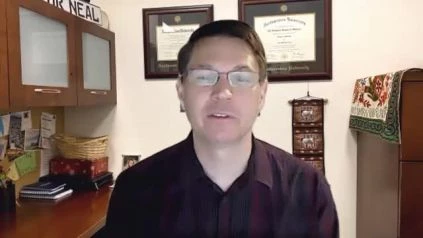Joel Neal, MD, Ph.D., Associate Professor Of Medicine (Oncology) from Stanford Cancer Institute/Stanford University speaks about Randomized Phase II Study of 3 Months or 2 Years of Adjuvant Afatinib in Patients With Surgically Resected Stage I-III EGFR-Mutant Non–Small-Cell Lung Cancer.
Link to Article:
https://ascopubs.org/doi/abs/10.1200/PO.20.00301
Synopsis:
OBJECTIVE
Multiple studies suggest that epidermal growth factor receptor (EGFR) tyrosine kinase inhibitors (TKIs) can delay cancer recurrence in patients with surgically resected disease. The amount of time that therapy must last in order to be effective is unknown.
SUMMARY
Patients with completely resected stage IA-IIIB EGFR-mutant non–small-cell lung cancer (American Joint Committee on Cancer 7th edition) after stage-appropriate standard-of-care adjuvant therapy were enrolled in this randomized phase II study. Patients were randomly assigned to receive adjuvant afatinib for 3 months or 2 years, starting at 30 mg daily by mouth. For the first three years, computed tomography imaging was done every six months, then once a year. The recurrence rate at 2 years after randomization was the primary study endpoint for this planned 92-patient trial. The goal was for a 20% improvement (from 70% after three months to 90% after two years).
OUTCOMES
A total of 46 patients were enrolled, with 45 of them receiving treatment. In the 3-month group, 96 percent (22/23) of patients completed their assigned course of afatinib treatment, compared to only 41 percent (9/22) in the 2-year group. The 3-month group had a recurrence-free survival rate of 70%, while the 2-year group had an RFS rate of 81 percent (P =.55). The 3-month group had a median RFS of 42.8 months, while the 2-year group had a median RFS of 58.6 months. Afatinib’s side effects were similar to those previously reported.
FINAL REMARKS
Two years of adjuvant afatinib was found to be 11 percent less likely than three months of adjuvant afatinib in terms of recurrences. Because of under accuracy and early drug discontinuation in the 2-year group, this difference did not meet the primary study’s 20% target. The optimal duration of adjuvant EGFR TKI therapy remains an important question, especially now that osimertinib is available with better efficacy and tolerability than earlier-generation agents.

